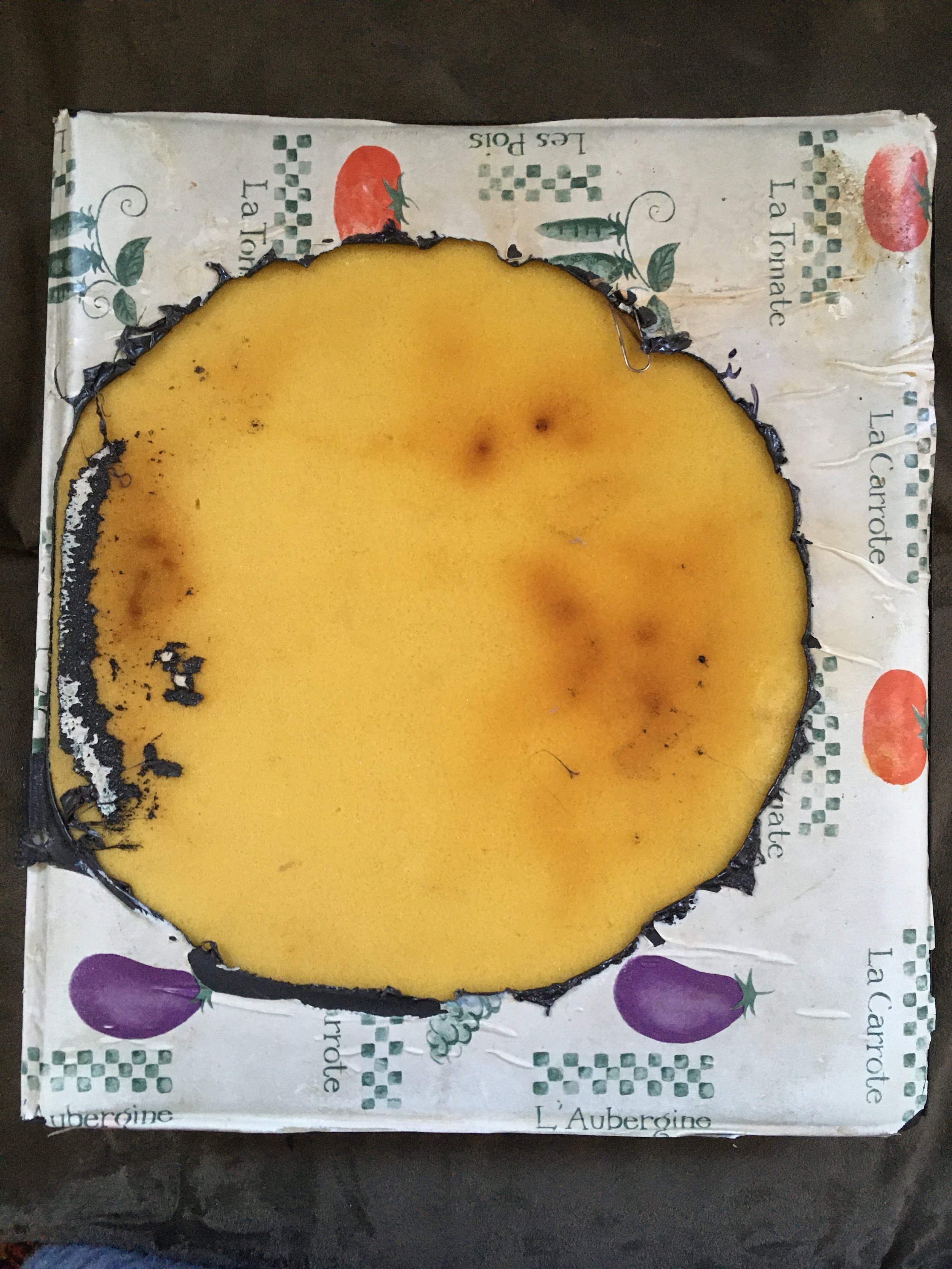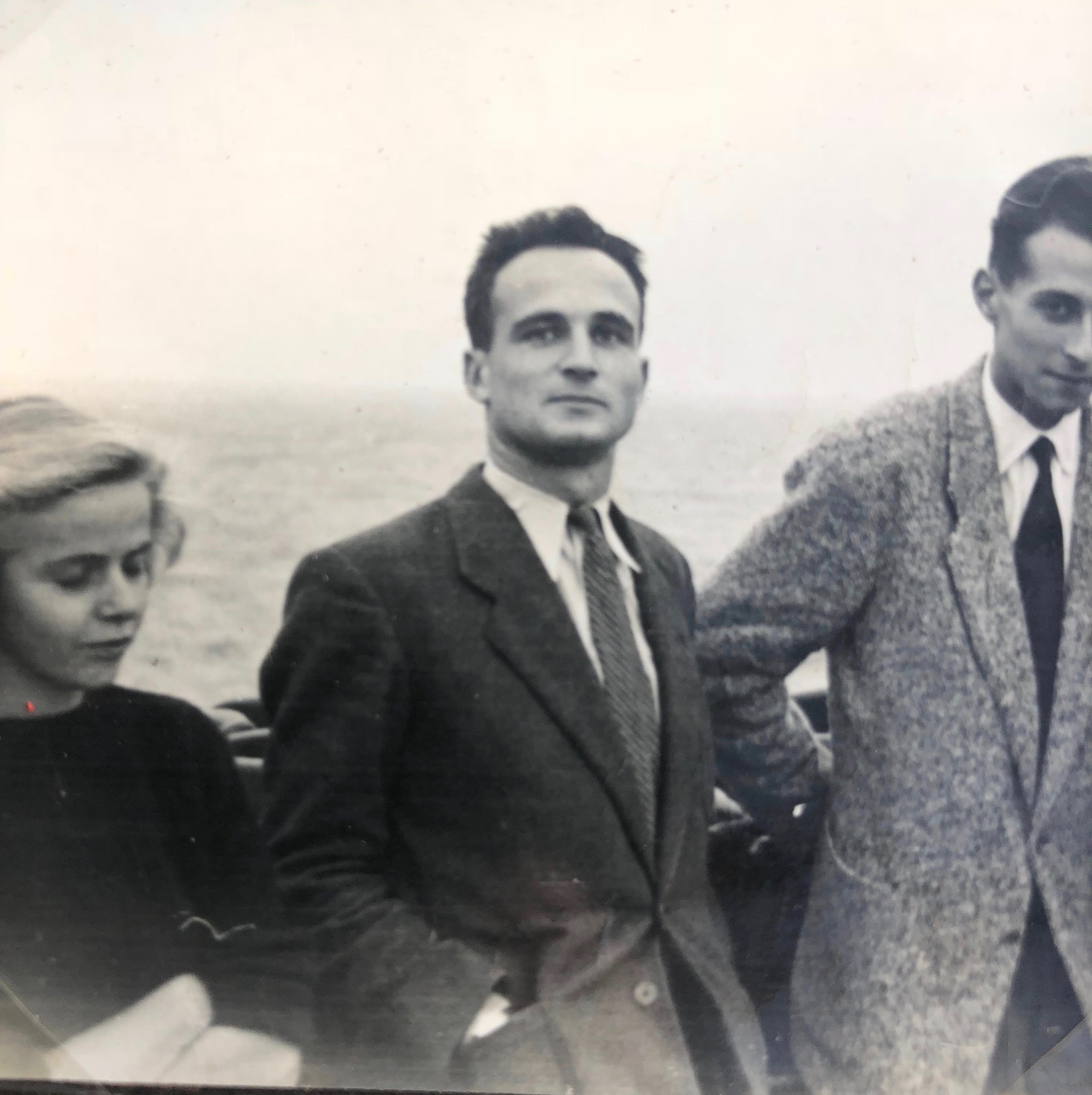Upcoming work:
I am working on a memoir based on a recipe notebook of my mother’s. That’s a picture of the notebook, with the plastic cover melted off when she placed a hot pan on top of it.
Honey was both a product of post-war America and a unique person. She raised five kids; I’m the oldest. I’m still the oldest. The Little Kids are in their sixties.
Honey married Jean, a Frenchman who left post-war France for the promise of America. Honey might have liked to live in France, but she respected his spirit. She had plenty of spirit herself.
In some ways we had the best childhood imaginable. And in other ways we were unprepared for the world we live in. Have we failed to live up to their aspirations? Or were their dreams too perfect for this world?
Here’s a sample of the writing:
.
Scrambled Eggs
Here’s the crux of the issue: what did she see in this guy?
As an adult, I interviewed Jean and took ten pages of notes, so these are mostly his words.
“I had two years of kindergarten in Toulouse. My teacher wrote me letters for years afterward.”
“When I was eleven, we moved to Annecy, in the Alps near the border of Switzerland. I took tennis lessons in Switzerland. Winters were terrible; six weeks with no sun. The apartment had no kitchen, so we ate every meal at a restaurant. And I saw every movie that came to the three movie theatres in town, lots of American movies, lots of American cartoons. The chauffer picked me up from school at 11:30 in the morning when classes were done, and he drove me around Lake Geneva. We stopped in Lausanne for hot cocoa. On Saturdays the chauffeur drove me to the ski slopes and waited until I was done skiing and drove me home.”
Before the war, Jean’s father (we called him Lépere) made a lot of money. “He was always giving me money, pushing it on me. I didn’t want any money.” Lépere did expect him to go someday to Polytechnique, the top school in France and his own alma mater. They did math problems together on a blackboard in Jean’s bedroom. But Jean was a very mediocre student; you had to get ten points out of twenty to move ahead, and Jean always got ten’s. Lépere never looked at their grades. Geneviève, Jean’s older sister by 3 years, signed Jean’s report card and Jean signed hers.
When Jean was 12, he and his sister went to school in another town about 60 miles away. Jean and Genevieve learned to drive. He drove half the route, she drove the other half, and their father slept in the back seat of the car, amidst the food and supplies they picked up in town. One day in a fog Geneviève drove off the road and crashed the car. The food in the car tumbled everywhere. The eggs were smashed and dripping from every surface. Jean’s father woke up and laughed at the looks on his children’s faces.
Then the war broke out; Jean was 14. Lépere re-enlisted as a 43-year-old captain and was sent to the Italian Alps for a few months until the French government collapsed and the troops were sent home. Jean continued with his schooling and summers on the farm.
A good skier, Jean was invited to train with the French Olympic team, but to do that, he would have had to quit school. Lépere said no.
At the end of the war, Jean was twenty and they moved to Paris so that he could continue his studies, three years of preparation for Ecole Superieure. Lépere bought a two-story ground apartment on the Bois de Boulogne, down the boulevard from the Duke of Windsor. It was hard to find apartments that year. Lépere subdivided and sold the upper floor. On the ground floor were three salons side by side with wide pocket doors. Jean opened all the doors and played tennis with Lépere in the three rooms.
Geneviève by 1946 had two kids and they moved into the Paris apartment temporarily. Jean gave her his bedroom and she didn’t move out until the 21st century.
After three years of studying, Jean didn’t get into Polytechnique; his grades were uneven. He was good in math, but no good in French, “terrible in Latin and Greek”. Mamy, laughing outloud, said he got a score of two in English and she imitated his pronunciation: “Good Bee, Jontlemen!” Lépere had always assumed Jean would get into Polytechnique, so when Jean failed, Lépere went with Jean on a long walk along the Bois de Boulogne and said, “I’m a little disappointed, but that’s fine.” Lépere had not had three years of tutoring in preparation for the entrance exam because he’d been on the front line in World War One. The professors had mailed him their assignments. Lépere took the entrance exam immediately after the war and got in.
Jean said later he didn’t care about getting into Polytechnique because he didn’t want government jobs anyway. He got into the second best school, Centrale, and the future president of France, Giscard D’Estaing, was a classmate.
After finishing his engineering degree, Jean got a Fulbright Scholarship to study in the US. Most of his friends going to America went to MIT for the equivalency degree; Jean didn’t want to study anymore. He boarded the De Grasse, a slow ocean liner that made the Atlantic passage in eleven days. There on board he met lots of ping-pong-playing young people, including Honey, traveling home with her two older sisters after the Great European Tour. When asked what his name was, Jean answered “Loustau.” When asked what his other name was, he replied “Loustau.” For the rest of the trip, his new friends called him “Loustau Loustau.” The only other English he knew was “Good morning Good night Thank you Yes.”
Honey said, “If you ever travel through Chicago, stop by.”
“Thank you Yes”
He got a job with the Bureau of Reclamation in Denver and learned fifty English words every night after work. But Jean wanted field experience and the job was a desk job. So where the contract said, “one year,” he crossed it out and wrote above “two months.” He traveled through the west, went to California, back to New York, waited around for a permanent visa, and seven months after arriving in America, he was in Lake Forest, knocking at the door. Honey wasn’t there. She was in Florida with her father to meet his next wife.
My notes say “4 mos courtship 3 mos engagement.” They married in the fall in Paris.
So I’m flipping through these notes forward and backward and wondering, what did she see in him? I get what he saw in her: she was pretty and fun and spoke French and she was smart and she came from a nice family and she was American.
I forgot to mention the sword fight. Honey’s brother Art took up fencing and challenged Jean to a duel. Just as I forgot to mention it, so Jean hadn’t mentioned it, that he was pretty good at fencing, too. He dueled Art into a corner and legend has it that Art fell through the front window of the Pope residence. Could it be that Honey saw a bit of D’Artagnan in this funny Frenchman?

